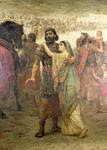Marcus Borg, The Heart of Christianity
The third holiday book I read and found exceptional was Marcus Borg's The Heart of Christianity. I first encountered Borg through his dialogue with Tom Wright in The Meaning of Jesus. Then a few years ago I read Meeting Jesus Again for the first Time. He's provocative for someone like me who veers more naturally towards the Tom Wright end of the spectrum, but very stimulating, and there were many good things that I drew from the book.
His premise is that we need to view the Bible as historical, metaphorical, and sacramental, and the Christian life as relational and transformational. In the first half of the book, Seeing the Christian Tradition Again, the chapters on faith, the Bible, and God were invigorating. The chapter on Jesus was familiar. The second half of the book is given over to the relational and transformational aspects, Seeing the Christian Life Again. There was much that was inspiring in terms of the opening of the heart and the heart of justice.
A particularly fascinating section concerns Thin Places which he describes in terms of 'a sacrament of the sacred, a mediator of the sacred, a means whereby the sacred becomes present to us. A thin place is a means of grace.' And while he refers to geographical places he extends thin places to music, poetry, literature, the visual arts, and dance. 'Even times of serious illness, suffering, and grief can become thin places. They do not always, of course; but sometimes our hearts are broken open by such experiences.' I liked his notion that people can become thin places, 'Many of us have known at least one or two people through whom we experienced the presence of the Spirit at particular junctures of our lives.' He goes on to look at worship as a thin place, and particularly the different components that constitute worship: music performed and participated in, sacraments, sermons, the Bible and liturgy.
An additional delight is that Borg quotes Frederick Buechner a number of times, and this led me to become reacquainted with this wonderfully insightful writer. It was uncanny to see that both Jim and Simon have posted on Buechner, Jim several times, in the last week.
Borg concludes with a chapter on Being Christian in an Age of Pluralism, and for those who seek spirituality but not religion he responds, 'religion is to spirituality as institutions of learning are to education ... Institutions of learning are the way education gets traction in history; so also religion is the way spirituality gains traction in history.'
A nourishing read for both head and heart.


Comments